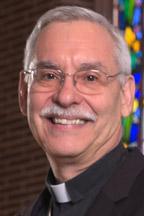
Bishop Anthony B. Taylor delivered this homily on Thanksgiving, Nov. 26.
No one emigrated because things were going so great in the Old Country. All my immigrant ancestors had problems in their country of origin. For instance, one of my grandfather Emil Roth’s relatives told me that his parents came here due to anti-Semitic persecution.
They had endured threats in what is now Poland for some time, but around 1887 they were burned out in a pogrom -- an anti-Jewish riot -- which was the last straw. Rather than rebuild, they pooled their money and sent three of the men to New York, including my great-grandfather Louis Roth. They worked and earned enough to bring my great-grandmother Jenny and their two oldest children over, starting in 1888.
My grandmother Ceil’s parents, Josef Fichtner and Josefa Meindl, immigrated from Bavaria because of poverty and also because they had a big problem: they had a baby on the way but couldn’t get married because Josef was from across the border in what is now the Czech Republic and had been working in Germany without legal status. He was a citizen of Austria-Hungary. They got married on Ellis Island.
But even here they faced challenges because of their foreign ways and accented English, especially when the U.S. went to war with Germany in World War I. I descended from people who were marginalized in their country of origin, and though things were better here, life was still hard for them. And the same is true for immigrants who come here fleeing violence and poverty today.
In today's Gospel Jesus encounters 10 men who were marginalized, in their case by leprosy, a horrible disease that people feared. It was worse than the threat of COVID-19. Most people do recover medically from the coronavirus, so the COVID quarantine is for 14 days. Leprosy, on the other hand, was chronic and at that time medically incurable, so outside of a miracle, people with leprosy were quarantined for the rest of their life. And so, by healing them, Jesus not only cures their disease with a miracle, he also ends their quarantine -- that's why he tells them to go get a clean bill of health from the priests.
In this way they could return home and resume a normal life. He redeems these 10 men, who otherwise would have remained marginalized by disease. But only one -- a Samaritan, a man doubly marginalized by ethnicity and disease -- returned to give thanks to Jesus.
On Thanksgiving I give thanks to Jesus for his many blessings, including thanks for bringing my ancestors to this land of hope to give us a better future. Can you imagine what my life would be like if they had remained in Europe? My family lost many relatives on my mother’s side of the family in the Holocaust, including 20 first cousins and their children who died at the extermination camp at Belzec. Only two of Emil’s first cousins are known to have survived the war; they had been sent to Auschwitz. If my great-grandparents had stayed behind, I would probably not exist. The fact that as an adult Emil had converted to Catholicism would not have made a difference to Hitler.
But the earthly redemption which we celebrate today is nothing compared to the eternal redemption we celebrate in the Eucharist, the very name of which – Eucharist -- is Greek for thanksgiving. But you know, the Samaritan leper in today’s Gospel wasn't grateful to Jesus just that one day. He was grateful all the rest of his life, the same as my immigrant ancestors and today's immigrants who are so grateful to God for their new American homeland, the blessings of which we so often take for granted.
But we should feel even more grateful to Jesus for redeeming us from the spiritual leprosy of sin. The Eucharist is our sacrament of thanksgiving. We gather around this altar of hope and join our grateful hearts to the loving heart of Jesus as he continues to offer himself in total sacrifice for us, who otherwise would not have a good eternal future.
Please read our Comments Policy before posting.
Article comments powered by Disqus Clergy blast Texas lawsuit targeting migrant ministry
Clergy blast Texas lawsuit targeting migrant ministry
 Don’t sign new abortion petition, Bishop Taylor asks
Don’t sign new abortion petition, Bishop Taylor asks
 Bishop says Hot Springs priest taking leave of absence
Bishop says Hot Springs priest taking leave of absence
 U.S. bishop hails government’s refugee plan for 2024
U.S. bishop hails government’s refugee plan for 2024
 Mass and holy hour mark start of Respect Life Month
Mass and holy hour mark start of Respect Life Month
 St. Paul says: How does the Bible define love?
St. Paul says: How does the Bible define love?
 6 steps to getting married in Diocese of Little Rock
6 steps to getting married in Diocese of Little Rock
 Most frequently asked questions on Catholic marriage
Most frequently asked questions on Catholic marriage
 St. Timothy winner recommends adoration to other teens
St. Timothy winner recommends adoration to other teens
 St. Joseph a model of solidarity with immigrants
St. Joseph a model of solidarity with immigrants
 Two gifts after Jesus’ death: Virgin Mary and Eucharist
Two gifts after Jesus’ death: Virgin Mary and Eucharist
 Why we have an altar, and not just a communion table
Why we have an altar, and not just a communion table
 Pope: Wars should be resolved through nonviolence
Pope: Wars should be resolved through nonviolence
 Living relationship with Jesus Christ in the Eucharist
Living relationship with Jesus Christ in the Eucharist